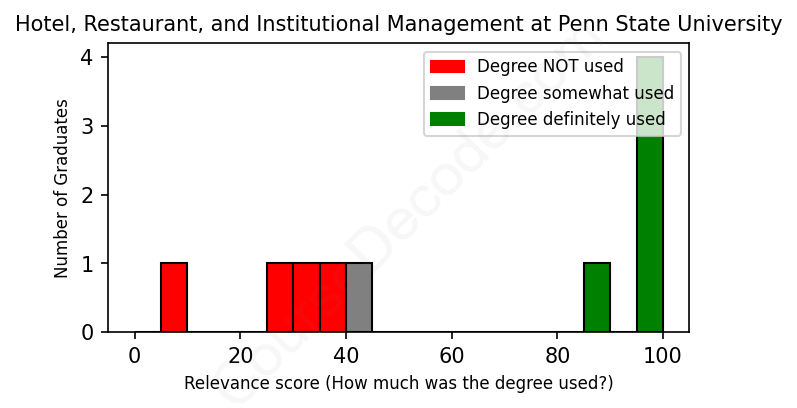
First, some facts. Of the Hotel, Restaurant, and Institutional Management graduates from Penn State University we've analyzed , here's how many have used (or NOT used) their degree in their career:

These are estimates based on AI analysis of 10 LinkedIn profiles (see below).
The verdict? Slightly below average. Overall, with an average relevance score of 62%, Hotel, Restaurant, and Institutional Management graduates from Penn State University have a slightly lower likelihood (-5%) of finding work in this field compared to the average graduate across all fields:
And for comparison, here's the chart for all profiles we've looked at across all degrees.
Also, after graduating, only 20% of these graduates have pursued further education other than another Bachelor's degree (such as a Masters degree or other), compared to the average across all profiles of 35%. This suggests a Bachelors degree is enough for most Hotel, Restaurant, and Institutional Management graduates, and it's normal to look for work straight after graduation.
See the details:
|
Relevance score: 100% We think this person has gone into a career highly relevant to their degree. We think this person has gone into a career highly relevant to their degree.
DEGREE INFOGraduated in 2014 from Penn State University with a Bachelor of Science (B.S.) in Hotel, Restaurant, and Institutional Management. No other secondary education since. JOB HISTORY SINCE GRADUATIONSous Chef Victory Brewing Company Dec 2014 - Present ABOUTNo information provided. |
The top 10 most common jobs done by the graduates we've analyzed (ranked most common to least) are:
When looking at the job roles taken up by graduates of the Hotel, Restaurant, and Institutional Management program at Penn State University, a few patterns really stand out. A significant number of these individuals have landed positions that are directly related to the hospitality industry, such as Event Planning Manager roles, Restaurant Supervisors, and various positions in hotel operations like Front Office Manager or Director of Guest Experience. These jobs clearly align with the skills and knowledge they gained during their degree, which makes sense since they revolve around managing hospitality services, food and beverage operations, and customer experiences.
However, not every role held by these graduates is closely tied to their field of study. Many graduates also take up positions that drift away from the hospitality focus—think roles in health services, corporate finance, or even real estate. For instance, several graduates transitioned into jobs like Patient Care Coordinator or Client Engagement Manager, which don't utilize hospitality management skills at all. So while there’s a solid representation of relevant job roles, it’s clear that some graduates have wandered off the beaten path, often entering industries that don’t leverage their hospitality training. Overall, we can say that there’s a mixed bag when it comes to how relevant their job roles are to their degree.
Here is a visual representation of the most common words in job titles for Hotel, Restaurant, and Institutional Management graduates (this is across all Hotel, Restaurant, and Institutional Management graduates we've analyzed, not just those who went to Penn State University):

When looking at the career paths of graduates from Penn State University who studied Hotel, Restaurant, and Institutional Management, it’s clear that many of them find their footing in relevant positions right after graduation. A lot of graduates kick off their careers in roles like management trainees, restaurant supervisors, or assistant managers in various hospitality settings. For instance, graduates from 2010 to 2016 frequently started with roles in hotel management or restaurant operations, which aligns well with their degrees. A few have even managed to climb the ladder relatively quickly, moving into roles like event planning managers and sous chefs just a few years into their careers.
However, it’s a mixed bag because, after about five to ten years, the trajectories start to diverge more significantly. While some alumni remain within the hospitality sector—advancing to higher management positions or specialized roles in event planning and food services—others have transitioned to jobs that are less directly related to their field of study, like project management or roles in healthcare and insurance. This suggests that while a solid portion of these graduates has had successful careers in hospitality, there are also notable numbers who have ventured outside the industry. Overall, the degree has served many well, but the path isn’t always straightforward, demonstrating a blend of stability and unexpected shifts in career directions.
Honestly, pursuing a Bachelor’s degree in Hotel, Restaurant, and Institutional Management at Penn State—or anywhere else—can be a decent mix of challenging and manageable. It’s definitely not the hardest major out there, but it does require a good amount of dedication and multitasking skills. You'll be diving into a blend of business principles, customer service strategies, and operational management, so if you’re organized and enjoy working with people, you might find it pretty engaging. Expect to balance hands-on projects, team assignments, and some theory, but overall, many students find it enjoyable rather than brutally tough. Just be prepared to put in the effort, and you’ll likely do fine!
Most commonly, in the LinkedIn profiles we've looked at, it takes people 4 years to finish a Bachelor degree in Hotel, Restaurant, and Institutional Management.
When you look at the job trajectories of these Penn State graduates, it seems like they've had mixed success in terms of financial stability. Some, like the recent grad who moved up from Starbucks to managing a company, are probably doing pretty well, considering that kind of upward mobility usually comes with a decent paycheck. On the other hand, several others have bounced around in roles that don’t seem to lead to big bucks—like those in food service or public library positions. It’s clear that the hotel and restaurant management field can pay off, especially with strong positions at well-known companies, but a few seem to have taken less lucrative paths that might not be enough to make a comfortable living. So, while some are definitely making good money, others might be just getting by, which is pretty common in these industries.
Here is a visual representation of the most common words seen in the "about" section of LinkedIn profiles who have a Bachelor degree in Hotel, Restaurant, and Institutional Management (this is across all Hotel, Restaurant, and Institutional Management graduates we've analyzed, not just those who went to Penn State University). This may or may not be useful:

Here are all colleges offering a Bachelor degree in Hotel, Restaurant, and Institutional Management (ordered by the average relevance score of their Hotel, Restaurant, and Institutional Management graduates, best to worst) where we have analyzed at least 10 of their graduates:
| College | Score | Count |
|---|---|---|
 Penn State University Penn State University
|
62 | 10 |